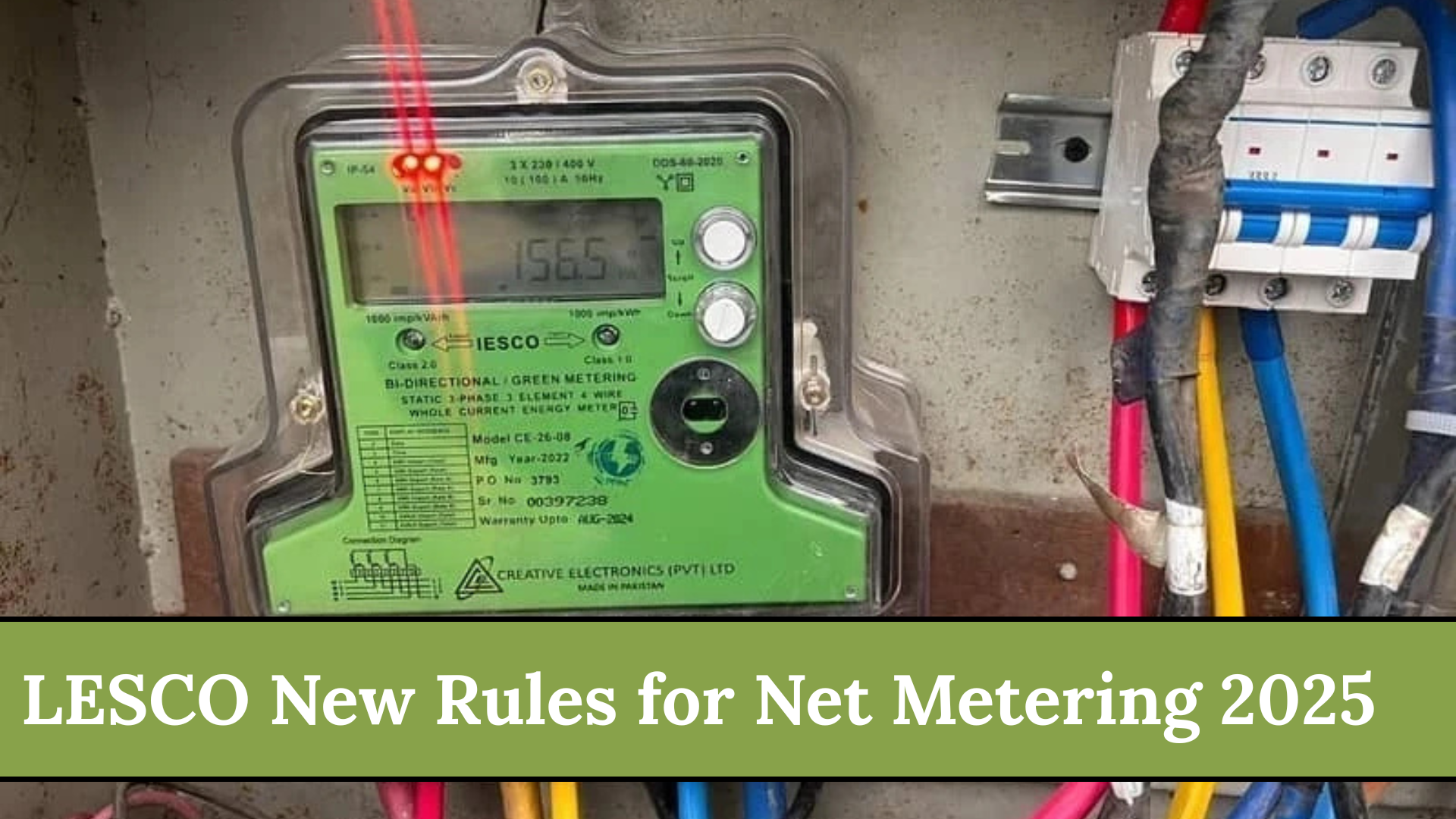LESCO New Rules for Net Metering. The Lahore Electric Supply Company (LESCO) has rolled out stricter net metering regulations in 2025 to ensure transparency and safety in solar power connections.
These new rules come after several reports revealed that many consumers were installing low-quality or unapproved solar inverters, putting the power grid and households at risk.
According to City42 News, LESCO now requires inverter registration and company details for all new solar net-metering applications. This move aims to maintain quality standards, reduce electrical risks, and keep accurate data records within the ERP (Enterprise Resource Planning) system.
Why LESCO Changed the Net Metering Rules
The decision follows a growing number of faulty or substandard inverters being connected to the grid, which can cause system instability and energy feedback issues.
LESCO’s updated policy ensures that all solar systems connected to the national grid are safe, certified, and compliant with NEPRA standards.
Main Reasons Behind the Update:
- Rising cases of unauthorized and unregistered inverters
- Risk of grid voltage fluctuation and system failure
- Lack of proper inverter traceability in records
- To ensure consumer accountability and data transparency
LESCO officials stated that this measure will improve power quality and consumer safety while helping the company maintain efficient monitoring of all solar connections.
Key Highlights of the New LESCO Net Metering Rules
Under the new 2025 policy, every net-metering applicant must follow additional verification steps before meter installation.
| New Rule | Description |
|---|---|
| Inverter Registration | Consumers must register the inverter number and manufacturer name before meter allocation. |
| ERP Record Entry | All inverter numbers must be recorded in the LESCO ERP System for official tracking. |
| Meter Allocation Rule | Inverter number must be provided with the demand notice. Missing details will result in cancellation of allocation. |
| Verification at Installation | LESCO will verify the inverter number during meter installation to ensure data accuracy. |
| Company Accountability | Solar installation companies must submit inverter details that match their official documentation. |
How the New Net Metering Process Works
The updated process requires more documentation and verification than before.
Here’s how the new solar net metering registration will proceed under the 2025 policy:
- Submit Net Metering Application:
Apply through LESCO’s official net metering department or authorized service centers. - Provide Inverter Information:
Mention the inverter serial number, brand, and installation company name in your file. - Demand Notice Submission:
Attach the inverter details with your demand notice during meter allocation. - LESCO ERP Entry:
Your inverter number and company name are entered into LESCO’s ERP system for record-keeping. - Meter Installation & Verification:
LESCO teams verify inverter details at the site before connecting your system to the grid. - Final Approval:
Once verification is complete, your meter is activated for net metering operation.
What Happens If You Don’t Register the Inverter
LESCO has made it clear that meter allocation requests without proper inverter registration will not be approved.
If a consumer fails to provide the inverter number along with the demand notice:
- The net metering process will be cancelled.
- The application file will not move forward.
- LESCO may require a fresh application with proper details.
This ensures that no unverified or low-grade equipment is connected to the grid.
Impact on Solar Companies and Consumers
These new regulations will significantly impact both solar companies and individual consumers.
For Solar Companies:
- They must submit detailed inverter records in each project file.
- Verification delays could occur if documents are incomplete.
- They will be held accountable for the quality of inverters they install.
For Consumers:
- More paperwork and approval time may be required.
- However, they’ll gain better reliability, safety, and accurate billing through verified equipment.
Industry experts believe that while this adds an extra step to the process, it ensures long-term safety and compliance with national energy standards.
LESCO’s ERP Integration for Transparency
By making inverter registration part of its ERP system, LESCO can now:
- Track every inverter’s brand and model.
- Prevent unapproved or duplicate installations.
- Maintain a centralized digital record of all solar systems.
- Identify faulty units faster in case of technical issues.
This digital transformation aligns with the government’s push toward smart grid management and renewable energy transparency across Pakistan’s power distribution companies.
Public Response to the New Rules
Many consumers have welcomed the decision, calling it a positive step toward safer renewable energy integration.
However, some homeowners and solar installers argue that the process may become more time-consuming, especially for small-scale solar users who rely on local vendors.
LESCO representatives clarified that these changes are for long-term benefits and will prevent power theft, faulty connections, and data manipulation within the system.
Future of Net Metering in Pakistan
The Net Metering Policy introduced by NEPRA has been a game changer for Pakistan’s renewable energy sector.
LESCO’s new rules will likely serve as a model for other DISCOs (Distribution Companies) in Pakistan, including IESCO, FESCO, and MEPCO.
As Pakistan aims to increase its solar power capacity under Vision 2030, these rules will help ensure:
- Standardized installations
- Improved grid reliability
- Consumer safety and transparency
LESCO’s initiative marks an important milestone in the country’s transition toward clean and regulated energy solutions.
Quick Summary Table
| Aspect | Details |
|---|---|
| Announcement Date | November 10, 2025 |
| Announced By | Lahore Electric Supply Company (LESCO) |
| Main Reason | Substandard inverter installations |
| Key Requirement | Mandatory inverter registration and ERP entry |
| Penalty for Non-Compliance | Meter allocation cancellation |
| Verification Step | Inverter number checked during meter installation |
| Goal | Transparency, quality control, and system safety |
Conclusion
The LESCO net metering update (2025) marks a crucial shift toward quality control and consumer safety.
By enforcing mandatory inverter registration, LESCO aims to eliminate low-quality installations, enhance grid stability, and promote fair energy generation practices.
Consumers planning to install solar systems must now register their inverter details and ensure that their installer complies with LESCO’s new documentation requirements.
These regulations may seem strict, but they’re designed to build a safer, transparent, and sustainable solar future for Pakistan.


















